In 1940, Aliceville in Pickens County, Alabama was an isolated, rural small town with a population of around 2,000 located in West Central Alabama. Starting in the summer of 1943, the population swelled to almost 10,000 in one year.
Aliceville, Pickens County, Alabama ca. 1950-60
During WWII the United States government was faced with the task of where to house a large influx of German prisoners after an overwhelmingly decisive victory at the Battle of El Alamein and in North Africa in November 1942.
Allied forces under General Bernard Montgomery devastated Field Marshall Erwin Rommel’s famous Afrika Korps, which resulted in the surrender of nearly three hundred thousand Axis soldiers. The U. S. Provost Marshall Generals office looked for sites to build internment camps for the prisoners and Aliceville as well as three other sites were chosen to house the prisoners in Alabama.
Barracks at POW camp in Aliceville, Alabama
Aliceville, Pickens County Internment Camp
The Aliceville Internment Camp held up to 6,000 German prisoners of war in 1943. The camp received its first prisoners in 1942 and closed in 1945. The majority of the prisoners were captured in 1943 from the German Afrika Korps.
Aliceville Internment Camp March 3, 1943 (Alabama Department of Archives and History)
Full Employment for the town of Aliceville
Under the supervision of Major Kark H. Shriver, Corps of Engineers, the Aliceville camp in Pickens County, Alabama was rapidly erected in the fall of 1942. Up to $75,000 per week was pumped into the Aliceville economy that fall with rooming house filled to capacity and by Christmas, the town experienced nearly total employment.
Guard tower, Aliceville Internment camp ca. 1943 (Alabama Department of Archives and History)
Headquarters building at the POW camp in Aliceville, March 1943 (Alabama Department of Archives and History)
The camp with 400 frame barracks was activated on December 12, 1942. However, the camp remained empty until the spring of 1943.
German Soldiers Marching to Aliceville camp (Alabama Department of Archives and History)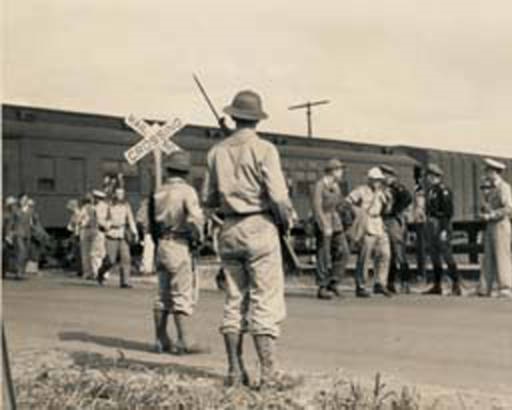
Armed with rifles, machine guns, shotguns, and pistols
On the late afternoon of June 2, 1943, “companies of soldiers stood along the entire length of the highway that stretched from the railroad station to the camp.”
German Soldiers Marching to Aliceville camp (Alabama Department of Archives and History)
The soldiers were armed with rifles, machine guns, shotguns, and pistols. It was unquestionably the greatest show of armed force most of the onlookers had ever seen, an “event,” wrote one correspondent, “that rivaled the cyclone that hit Aliceville six years ago.”
German Soldiers Marching to Aliceville camp (Alabama Department of Archives and History)
A large crowd was on hand when the train pulled up to the depot and 500 members of the “once invincible Afrika Korps poured off the train and stood blinking in the glare.” The prisoners wore an assortment of tattered uniforms and “clutched meagre stores of possessions in their hands: tattered duffle bags, an occasional musical instrument, a checkerboard.”
German Prisoners getting off train in Aliceville, Alabama (Alabama Department of Archives and History)
Residents of Aliceville watch as German soldiers march to camp (Alabama Department of Archives and History)
English speaking German needed
Once they were off the train, a guard moved down the lines and asked if anyone spoke English. “A slim, bespectacled man in a torn, blue coat slowly raised his hand.” He was led to the front of the formation and the prisoners were marched to the newly built camp. By the end of the week 3,000 prisoners were being held at the prisoner-of-war camp.
German Soldiers in formation on way to Internment Camp (Alabama Department of Archives and History)
Colonel F. A. Prince was the commander of the Aliceville camp. Many of the prisoners had suffered from scant food and were severely malnourished so the commander made the decision to open the mess hall that night.
At 2 A.M., the first night, the prisoners sat down to their first substantial meal in months. Some of the prisoners thought the abundance of food was a trick, an edible form of propaganda that would soon end, but they soon discovered this was not the case. As the camp population grew, 21,000 meals were provided daily to the 6,000 prisoners.
Life in the camp was governed by the third Geneva Convention. Early on, the United States and Britain had pledged that all their POW camps would strictly adhere to the Convention, initially adopted in 1929. This convention (treaty) defined humanitarian conditions for prisoners of war by providing a list of what was and wasn’t acceptable treatment.
Shortly after the prisoners’ arrival in Aliceville, an unknown respiratory illness occurred among the prison population and some prisoners began to die. The medical staff was at a loss as to what the illness was until doctors Captain Stephen Fleck, Captain John Kellam and Major Arthur Klippen solved the respiratory mystery.
Autopsy results on some of the patients indicated a form of diphtheria and bacterial tests finally confirmed that it was pharyngeal diphtheria, a form of the disease virtually unknown in the United States. Once the diagnosis was made, Schick tests to determine immunity were done and it was discovered that over 1,200 soldiers had tested positive. Immunization began immediately, and within days the results were encouraging and halted deaths to the disease.
Gardens and pathway between barracks at the German POW camp in Aliceville, Alabama (Alabama Department of Archives and History)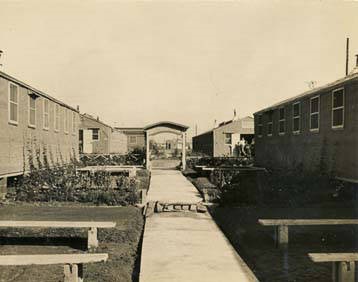
“Arrayed around the barracks were mess halls, a hospital, several small indoor theatres, recreation areas, and storage facilities, a small city. Some of the barracks had radios. Within a week, the prisoner population had ballooned to over 3000, and the workforce of captives had begun to transform the camp.
Elaborate landscaping in a garden between barracks at the German POW camp in Aliceville, Alabama ca. 1943. German sentence says “Through German character the world will be healed.” (Alabama Department of Archives and History)
Wearing blue denim uniforms with the letters “PW” stenciled across the back, they toiled diligently in their spare time, improving their quarters and the grounds. They also took charge of their own cooking, and the smells of German pastries, of baking ham and boiling cabbage, soon permeated the air.”
German prisoners working in the Greenhouse in camp ca. 1944 (Alabama Department of Archives and History)
German prisoners of war playing soccer at the POW camp in Aliceville, Alabama (Alabama Department of Archives and History)
Prisoners received 80 cents a day for their labor, wages that could be spent on “luxury items” in commissaries within the camps.
“Life within the camps was so comfortable that one German prisoner wrote his family and described his temporary home as a “golden cage” and, conversely, some Alabama residents resented what they perceived as the POWs’ pampering while they endured rationing. Few POWs attempted to escape, and several of those who did were killed in the attempt. The comforts of camp life discouraged most escape attempts, however”i
“The only dangers within the camps were the periodic political struggles among the prisoners. German soldiers committed to National Socialism (Nazism) fought with fellow prisoners who displayed anti-Nazi sentiments. To head off such ideological conflicts, American camp personnel separated Nazi and anti-Nazi factions within Alabama’s camps. Army officials then moved the two groups into special camps located outside of Alabama.”ii
Nothing is left at the site of the camp in Aliceville now. Everything has been torn down but the Aliceville Museum and Cultural Center has preserved and promoted the WWII experience in Alabama and houses valuable artifacts and records of the camps. Many friendships developed between prisoners and guards and some prisoners have even returned to Aliceville for a reunion.
Other German war prisoners were held in Alabama at camps in Opelika, Fort McClellan, and Fort Rucker
Interesting short story on Aliceville
http://www.radiolab.org/story/nazi-summer-camp/
SOURCES
- Alabama Department of Archives and History
- The Camp Aliceville story
- Inside the Wire, Aliceville and the Afrika Korps
Related Stories
Photographs of wounded World War II veterans in 1945 at Northington Hospital in Tuscaloosa, Alabama
Life during WWII was very different from today – [vintage film & pictures]


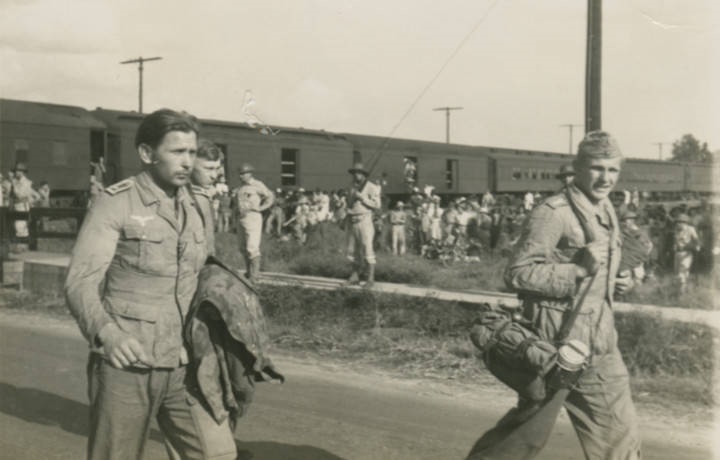
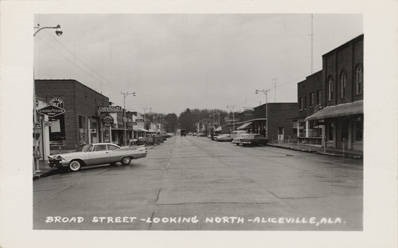
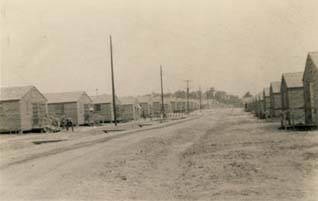
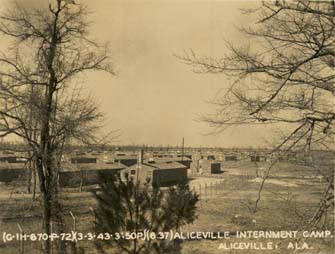
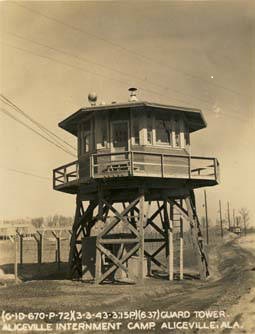
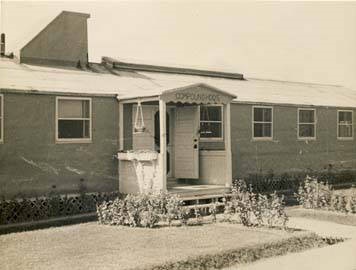
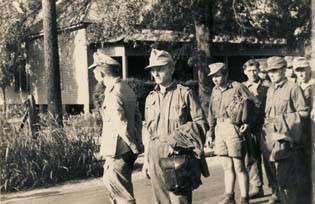
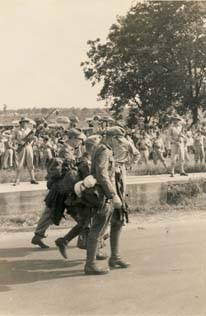
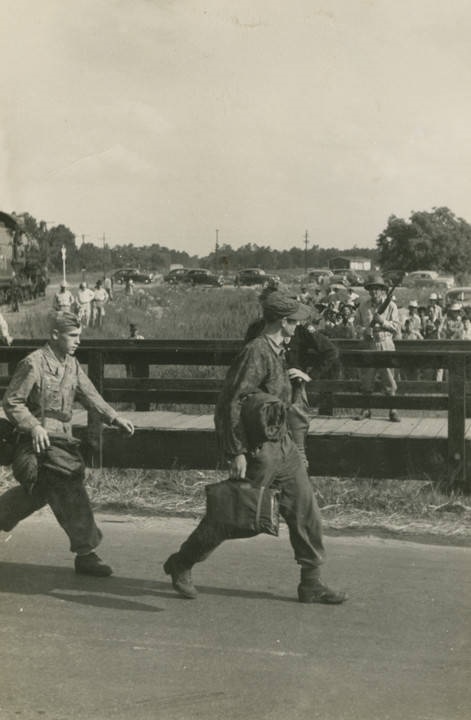
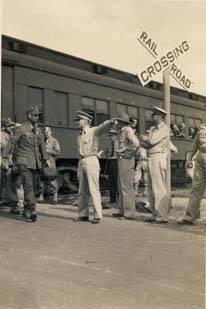
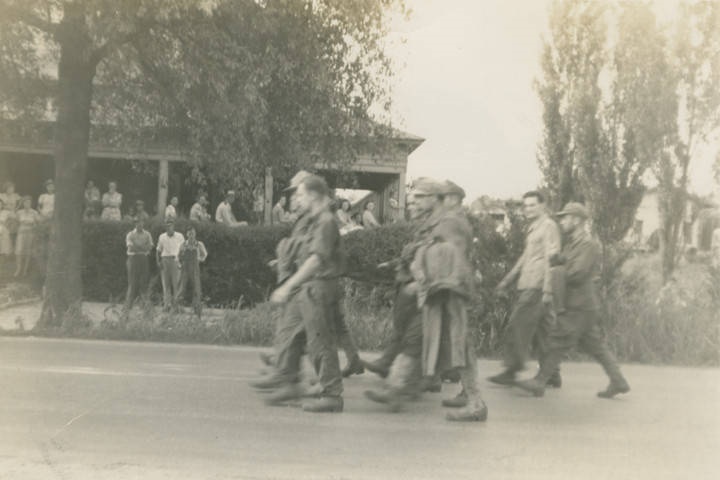
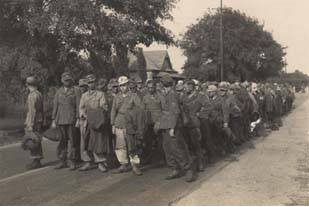
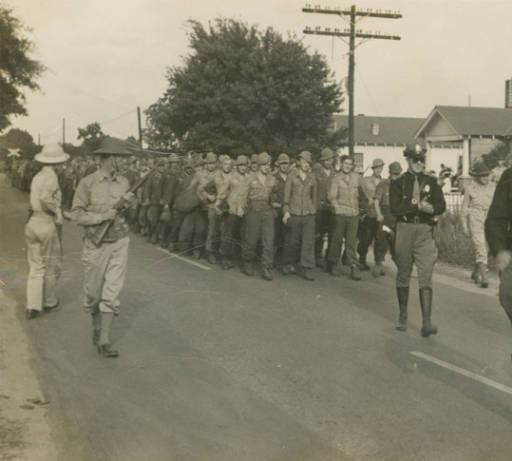
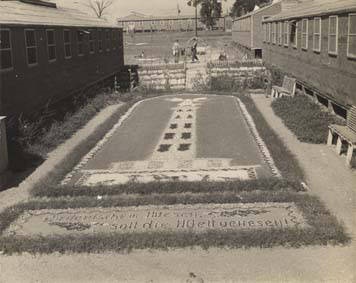
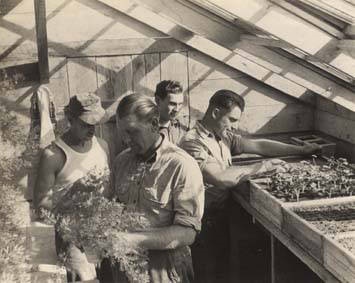
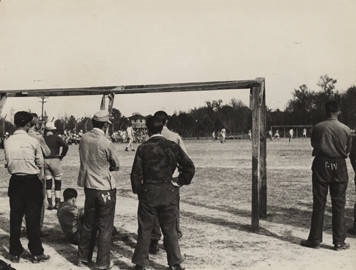


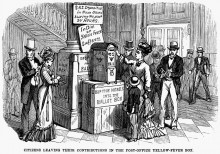
i LIVED IN ATTALLA, AL DURING THOSE YEARS, AND WAS AWARE OF THE PW/CAMP SIBERT.., PLUS
IT WAS ALSO AN ARMY TRAINING BASE.
ANY INFORMATION OF SUCH AVAILABLE?????
I saw an interview with a German prisoner of war who was brought to this camp on a train. He said they had apprehension because a large number of the townspeople had gathered to see them arrive. The soldier said that they were concerned because they did not know how this large group of Americans would respond to them. He stated that he then noticed many of the people go into the train station. He said they came out with coffee. sandwiches and other things for them to eat and they were hungry when they arrived. i am proud of those Aliceville citizens for doing that and showing humane behavior toward them. Both my father and stepfather were in POW camps in Germany and they were not having it very easy because they were starving. The war was at a stage where even their captors did not have much food. Daddy said he was standing in the yard one day with a German guard nearby and he heard something drop close to him. He noticed that it was a chocolate candy bar. He reached down, scooped it up and quickly put it in his pocket. He said that this soldier could have been killed for doing what he did and that may have been all he had to eat for that day.
My dad was a guard there in aliceville Alabama after the prisoners went home some wrote him became friends years later we lived at the old army camp a lot of other family did too if you have any information can you send it to me I sure would love to find a video of him are a picture he was good to him and they were good to him
[…] In 1943, a Prisoner of War camp which housed 6,000 prisoners was built in Aliceville, Alabama [pics … […]
My Uncle Clyde Martin was a guard in Aliceville and I have a letter one of the German prisoner’s wrote him after the war
My father, Henry H. Madison worked at this Prison Camp in Aliceville Alabama during the construction. I was a small child and knew only that he went to work in Aliceville, Alabama. In later years I was told what he did in Aliceville and that his brother James Lafayette Madison also worked on this project.
History is habit forming. I’m an addict.
I like it too…I would love to go through the US learning the real history of our country and the people who made it. ….just saying
Brandi Bishop Joel Stancer
My dad Robert R Weekley guarded prisoners at Aliceville. After the war some of my kin lived at the camp. We lived in Aliceville at one time. After the war my mom & dad worked in the cotton mill there & we lived in the cotton mill village. My middle brother was born in Aliceville. My grandad & grandmother lived & died in Aliceville.
Colby Hamner….ask hicks is this the camp that was located on Twin Rivers hunt club
They were treated so well. Proud of that.
That was an interesting read
Been there, my home town is just a little ways from there!
Interesting. Very good
He thinks so.
Wow surprised I never knew this.
There’s a fair amount of information about Camp Aliceville, but not Camp Sibert. Could someone please tell me about Camp Sibert? Was it a satellite of Camp Aliceville?
Thank you so much for sharing this!!!
I’m glad you enjoyed it!
Richard Jesse
Some of those men returned to the U. S. in later years due to their good treatment and the warm weather. They even liked the southern food. I know because I met one of them. A man that returned and knew my daddy and collected coins like he did!
Would love to read a out the German POW’s at Fort Rucker, also. I remember them coming to our farm to help pick cotton and stack peanuts. We had to furnish meals for them. Had to feed them what we had and what we ate, but they did not eat corn on cob, said it was for swine.
Hello,
My father was war prisoner in the Second workd wäre in Alabama. He died 1980 and I don’t know in which Camp in Alabama he was arrested. He talked me from alabama, that earthnuts grow not in the earth….. in Germany we think so… they grow on bushes (sorry my English is bad!). I was a little girl and remember me!
My father Heinrich Wolf born 11, July 1914, was a German soldier in Tunesia, than he was war prisoner of the USA and must go by ship to Alabama. But I don’t know in which camp? He worked by farms.
1945, on the end of the 2. worldwide USA changed prisoners with France, my father must go to France and worked by france farmers till 1949. Than he come back to Germany/Bavaria . Which people can say me, in which camp my father lived in Alabama?????
Wonderful !
My mother was a nurse at the camp. My daddy was stationed there.
Beverly Walker
Great book of interviews on this I read:
Guests Behind the Barbed Wire https://www.amazon.com/dp/1575872609/ref=cm_sw_r_cp_api_9SQrxbF58V376
We visited and it was great. We may go back.
Very interesting, learned something new.
Do you have any information on the POW camp just south of Foley, AL? Would love to learn about that.
Not yet. Maybe I’ll find something some day.
I knew Camp Rucker was a POW camp, but did not know about Aliceville. Thank you for the info.
midge durbin
We were in Mobile during the war but I remember the pow camp in Aliceville.
There was also a small camp in Troy, AL,
Very interesting article . I always been curious to learn about historical facts . I think they should make a movie about this historical incident .
This article is so refreshing. Thank you for your writings.
Great read for someone like myself who loves history. Please keep these wonderful stories coming.
Thanks.
I find it very telling, and it demonstrates exactly where black people, fellow American citizens, rank in the hearts and minds of white people.
black soldiers fought bravely in WWII, my father was one of them.
it is a common consensus in western civilization that members of the Nazi party are the most repugnant individuals of the civilized world.
yet these prisoners of war were treated with respect, dignity and civility.
I must admit, this bit of history has opened my eyes and made me aware that,
“in the eyes of many whites then an now black people rank well below the scum of the earth”
I now understand my place in the scheme of society as you see it, this website illustrates that extremely well.
Mike Oakley
Sharon Oakley
Rayford Newman
John W. Brandon
Jennifer Bondurant Steele
My mother worked in this camp as a civilian employee for one year soon after graduating from the University of Alabama. She was a hospital dietician. She told me that while she worked there, one prisoner refused all food for two weeks so that he would have a better chance of escaping under the fence. He was fatally shot in his attempt to escape. Mom said that was the only prisoner who was killed while she worked there. . . Mom and I attended the first staff/prisoner reunion hosted by the Aliceville Museum, which occupies the old Coca-Cola bottling plant. Some of the prisoners & their family members attended that reunion. Quite a few of the prisoners’ families have donated their prison memorabilia to the museum in Aliceville. I have some memorabilia as well that I’m in the process of donating to the museum. It is an amazing, interesting museum & well worth a trip to see! See their FB page.
Can you share their facebook page?
My maternal great grandparents had POW’s working their farm and this was in the Dale County area. My grandfather was an MP and escorted a few POW’s to and from. He would also take them from the east coast down to the Ft. Polk area.